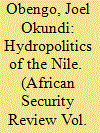| Srl | Item |
| 1 |
ID:
157505


|
|
|
|
|
| Summary/Abstract |
Egypt and Ethiopia continue to oppose one another over the allocation of the waters of the Nile River basin, despite a succession of provisional multilateral agreements. Officials in Cairo insist that Egypt be guaranteed its “historic rights” to two-thirds of the river’s flow, while their counterparts in Addis Ababa demand an “equitable” distribution of water among all of the riparian countries. More important, Sudan’s shift in alignment from Egypt to Ethiopia has injected new tension into the dispute, and the sustained involvement of South Sudan, Kenya, Uganda and Eritrea heightens the likelihood that periodic crises will escalate into armed confrontations. Consequently, existing studies that offer sanguine assessments of the potential for a compromise settlement fail to address the key dynamics that drive the conflict.
|
|
|
|
|
|
|
|
|
|
|
|
|
|
|
|
| 2 |
ID:
031311


|
|
|
|
|
| Publication |
London, Hodder and stoughton Limited, 1984.
|
| Description |
160pHbk
|
| Standard Number |
0-340-27998-2
|
|
|
|
|
|
|
|
|
|
|
|
Copies: C:1/I:0,R:0,Q:0
Circulation
| Accession# | Call# | Current Location | Status | Policy | Location |
| 024803 | 551.483/FRA 024803 | Main | On Shelf | General | |
|
|
|
|
| 3 |
ID:
144710


|
|
|
|
|
| Summary/Abstract |
This article analyses the political relationship between Ethiopia and Egypt. It aims to provide an analytical framework to unpack this complex relationship and assess the impacts that the Nile River has on the nature of this relationship. It further identifies geopolitical factors determining the impacts of the Nile River on frameworks of actions and political opportunity structures in which political actors operate. Accordingly, the different combinations of these determinants lead to the formation of political actors and ensuing actions that can fuel conflict, sustain the status quo or build peace. The article seeks to provide tentative answers to the following questions: what can be done or what mechanisms might be used to reduce the risk of conflict? What parties should participate and what will be their roles? And how can modern technology and science contribute to a possible solution?
|
|
|
|
|
|
|
|
|
|
|
|
|
|
|
|
| 4 |
ID:
029590


|
|
|
|
|
| Publication |
London, Dennis Oobson., 1970.
|
| Description |
192p.hbk
|
| Standard Number |
234774835
|
|
|
|
|
|
|
|
|
|
|
|
Copies: C:1/I:0,R:0,Q:0
Circulation
| Accession# | Call# | Current Location | Status | Policy | Location |
| 004905 | 962/OCL 004905 | Main | On Shelf | General | |
|
|
|
|
| 5 |
ID:
183193


|
|
|
|
|
| Summary/Abstract |
Between 2007 and 2018, water-based protests in Egypt received extensive visibility in media headlines. These protests were first sparked by events in a village in the Nile Delta in 2007; since this demonstration, water-based protests, known as Thawrat al-‘Atash or the Thirst Revolution, have become widespread. Nevertheless, the vast majority of academic research looking at social movements in Egypt has focused on urban protests. This paper investigates the dynamics of water-focused protests in rural Egypt. We use a political ecology approach to understand ecological distribution conflicts and the perceived unjust distribution of water that was behind the social unrest. The article includes a classification of local-scale water-based protests in rural Egypt, which breaks down their causes and shows how the protest movement is embedded within biophysical, water management and agriculture development politics.
|
|
|
|
|
|
|
|
|
|
|
|
|
|
|
|